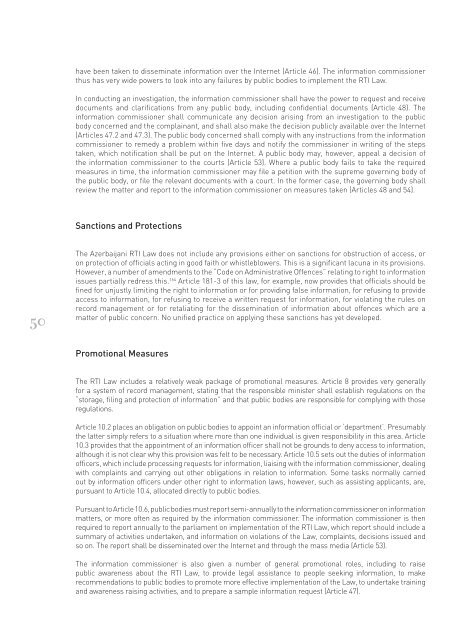Freedom of Information: A Comparative Legal Survey - Federation of ...
Freedom of Information: A Comparative Legal Survey - Federation of ...
Freedom of Information: A Comparative Legal Survey - Federation of ...
Create successful ePaper yourself
Turn your PDF publications into a flip-book with our unique Google optimized e-Paper software.
50<br />
have been taken to disseminate information over the Internet (Article 46). The information commissioner<br />
thus has very wide powers to look into any failures by public bodies to implement the RTI Law.<br />
In conducting an investigation, the information commissioner shall have the power to request and receive<br />
documents and clarifi cations from any public body, including confi dential documents (Article 48). The<br />
information commissioner shall communicate any decision arising from an investigation to the public<br />
body concerned and the complainant, and shall also make the decision publicly available over the Internet<br />
(Articles 47.2 and 47.3). The public body concerned shall comply with any instructions from the information<br />
commissioner to remedy a problem within fi ve days and notify the commissioner in writing <strong>of</strong> the steps<br />
taken, which notifi cation shall be put on the Internet. A public body may, however, appeal a decision <strong>of</strong><br />
the information commissioner to the courts (Article 53). Where a public body fails to take the required<br />
measures in time, the information commissioner may fi le a petition with the supreme governing body <strong>of</strong><br />
the public body, or fi le the relevant documents with a court. In the former case, the governing body shall<br />
review the matter and report to the information commissioner on measures taken (Articles 48 and 54).<br />
Sanctions and Protections<br />
The Azerbaijani RTI Law does not include any provisions either on sanctions for obstruction <strong>of</strong> access, or<br />
on protection <strong>of</strong> <strong>of</strong>fi cials acting in good faith or whistleblowers. This is a signifi cant lacuna in its provisions.<br />
However, a number <strong>of</strong> amendments to the “Code on Administrative Offences” relating to right to information<br />
issues partially redress this. 164 Article 181-3 <strong>of</strong> this law, for example, now provides that <strong>of</strong>fi cials should be<br />
fi ned for unjustly limiting the right to information or for providing false information, for refusing to provide<br />
access to information, for refusing to receive a written request for information, for violating the rules on<br />
record management or for retaliating for the dissemination <strong>of</strong> information about <strong>of</strong>fences which are a<br />
matter <strong>of</strong> public concern. No unifi ed practice on applying these sanctions has yet developed.<br />
Promotional Measures<br />
The RTI Law includes a relatively weak package <strong>of</strong> promotional measures. Article 8 provides very generally<br />
for a system <strong>of</strong> record management, stating that the responsible minister shall establish regulations on the<br />
“storage, fi ling and protection <strong>of</strong> information” and that public bodies are responsible for complying with those<br />
regulations.<br />
Article 10.2 places an obligation on public bodies to appoint an information <strong>of</strong>fi cial or ‘department’. Presumably<br />
the latter simply refers to a situation where more than one individual is given responsibility in this area. Article<br />
10.3 provides that the appointment <strong>of</strong> an information <strong>of</strong>fi cer shall not be grounds to deny access to information,<br />
although it is not clear why this provision was felt to be necessary. Article 10.5 sets out the duties <strong>of</strong> information<br />
<strong>of</strong>fi cers, which include processing requests for information, liaising with the information commissioner, dealing<br />
with complaints and carrying out other obligations in relation to information. Some tasks normally carried<br />
out by information <strong>of</strong>fi cers under other right to information laws, however, such as assisting applicants, are,<br />
pursuant to Article 10.4, allocated directly to public bodies.<br />
Pursuant to Article 10.6, public bodies must report semi-annually to the information commissioner on information<br />
matters, or more <strong>of</strong>ten as required by the information commissioner. The information commissioner is then<br />
required to report annually to the parliament on implementation <strong>of</strong> the RTI Law, which report should include a<br />
summary <strong>of</strong> activities undertaken, and information on violations <strong>of</strong> the Law, complaints, decisions issued and<br />
so on. The report shall be disseminated over the Internet and through the mass media (Article 53).<br />
The information commissioner is also given a number <strong>of</strong> general promotional roles, including to raise<br />
public awareness about the RTI Law, to provide legal assistance to people seeking information, to make<br />
recommendations to public bodies to promote more effective implementation <strong>of</strong> the Law, to undertake training<br />
and awareness raising activities, and to prepare a sample information request (Article 47).
















